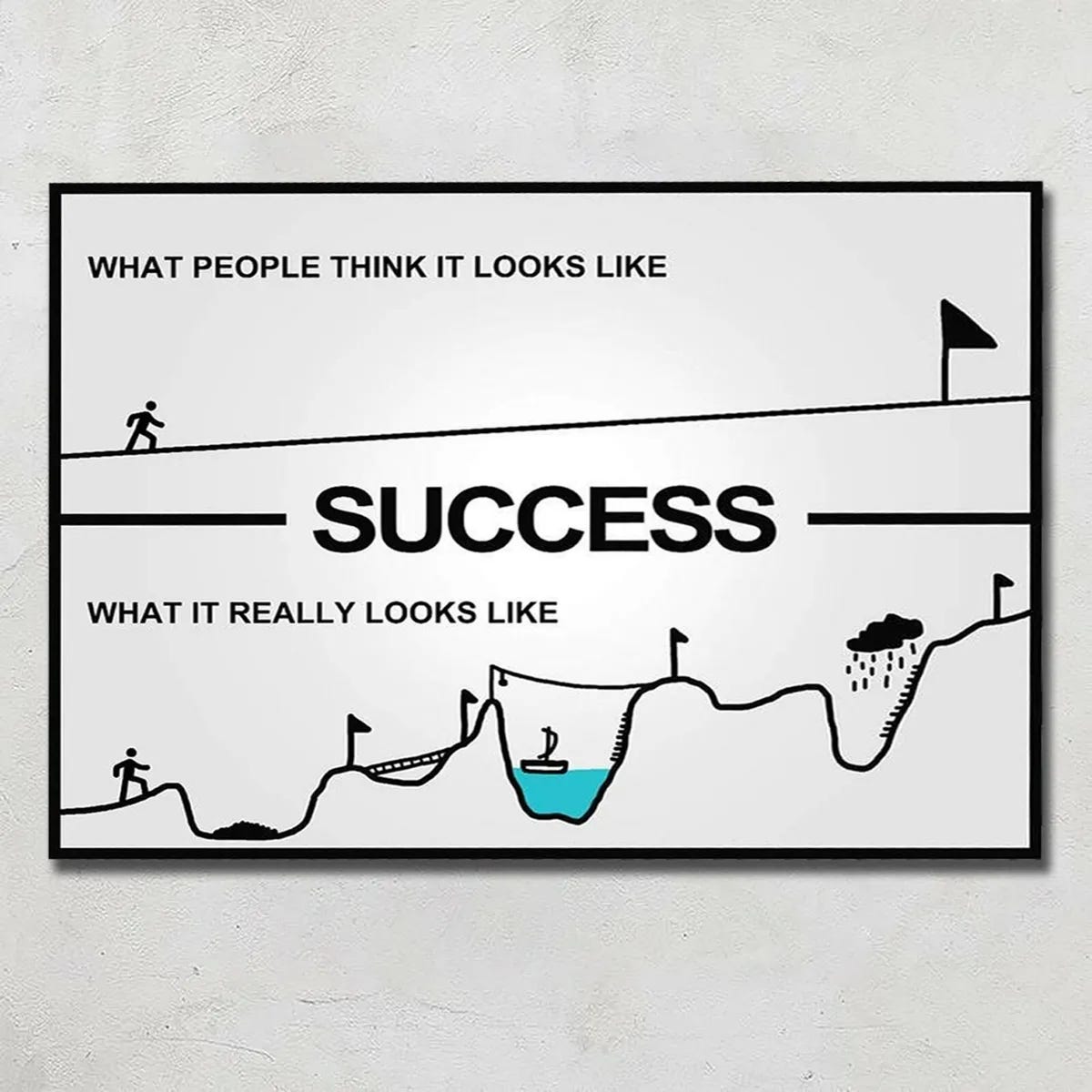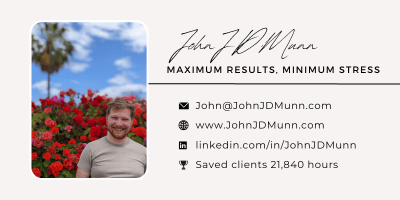🎯 Work Smart Wednesday - April 17, 2024
How to think like successful people, results from my recent experiment, and a quote on decision making
Work Smart Wednesday
👋 Hey there!
Here is your weekly dose of Work Smart Wednesday
In these emails I will share with you 3 things to help you work smarter in 3 minutes or less. That leaves you with 10,077 more minutes to conquer your goals this week
1. 🧠 How to think like successful people
Most people think like poor people. Poor in money, time, happiness…
Unfortunately, to be a successful business owner, you need to think like a successful business owner. To be a successful person, you need to think like a successful person.
To change how you think is incredibly difficult. Especially without external correction.
That is one of the main reasons why the Jim Rohn advice “you are the average of the 5 people you spend the most time with” has proved effective. The people you surround yourself with affect your thinking, and help correct it (to whatever they feel is correct!). If you want to be successful, it helps to regularly speak with people who are successful.
In lieu of you having - or hiring - somebody successful to speak with, this short article briefly introduces some very important mindset shifts that help you think more like a successful business owner would. Two of my favourites:
Neutrality
Misidentification
Two useful quotes:
“All events are neutral. All circumstances are neutral. It is only your thoughts about the events and circumstances that are positive or negative. When you think that an event or circumstance is negative, you resist it and suffer.”
“When you think you are the image and narrative you have in your mind about who you are… the focus of your life becomes improving the image and narrative (money, status, success, fitness, attractiveness, etc)...When you think you are your body, the focus of your life becomes keeping the body healthy and alive.”
It is a short article. It will make you think. It may even kickstart some important mindset shifts for you.
I recommend that you read it: https://medium.com/@davekashen/the-course-826a94333bd5
👋 Want to work together?
When you’re ready, here are 3 ways I can help you:
🔍 Clarity Call - we will discuss your situation and create a step-by-step action plan together so you know exactly what you need to do next for maximum impact
👓 StartSmart - Achieve a 6 figure income within 6 months, whether you only have an idea or you have already started your business
🧘 Overload to Optimal - reduce your workweek to 20 hours or less within 90 days while running your 6-8 figure business
2. 🔬 The results from my recent experiment
Last week, I ran an experiment. You can see it here.
I aimed to get recommendations for professionals I can collaborate with - competent people I can recommend, buy from, or cross-promote with.
While the experiment was unsuccessful in its objectives - I didn’t get any relevant recommendations - I am still glad that I did it.
Why do I think it failed in its core objective (recommendations)? What am I doing about it?
Possible issues and discussion:
Not enough people saw it
My open rate on my email last week was 11% lower than normal. That is a big drop. Three reasonable explanations jump out:
My Work Smart Wednesday issue two weeks ago sucked, so people didn’t want to open the next one (which was last week’s)
The titles of last week’s issue sucked, so people didn’t bother opening it
Some of the words in last week’s issue triggered spam filters, so more people never saw that they had the email so couldn’t open it.
My bet would be the spam issue as the drop was so large. If it were the other issues, I am likely to have seen a spike in unsubscribes alongside engagement (but I didn’t). I know I included some known spam words in the email last week, but I thought I would get away with it as I have built up credibility with my openers over a long period. I don’t think I did, hence why I am avoiding those words in this email. I am monitoring editions more closely to double check this assumption.
If you thought the previous titles or editions sucked and that prevented you from engaging, please reply to this email to let me know!
However, the offer was still exposed to ~1,500 people. A typical conversion rate for online giveaways is roughly 25%, so I would expect some recommendations. I don’t think lack of exposure was the issue.
Prize wasn’t big enough
The prize was relatively small, I could certainly afford to offer a bigger prize. While my current CAC is much lower than the prize that was offered, I can afford to spend much more as my retention rates are so good (when people have a call with me they almost always convert to becoming a client and usually want to continue working with me for a long time).
CAC is important when calculating how much you can spend on campaigns as it indicates how much you can spend per acquisition. If I assumed even 1 client would come from this campaign, thanks to collabs with those recommended, the campaign would pay for itself multiple times over.
However, I have seen this work recently with much smaller prizes. I feel it should have been enough. I will re-run the experiment in the near future to test this, both prize size and prize type (maybe money was the wrong choice!).
Prize was too big
Big companies routinely offer smaller prizes than I did. It is possible that mine seemed too big to be true. Certainly possible. Worth testing.
Perceived chance of winning was too low
Most people don’t try when they think they will lose. Only one person would be selected, which may have put people off from trying. I feel this is a strong likelihood.
Timeline to apply was too short
I settled on one week to provide a sense of urgency. Longer would allow people more time to think of who to recommend, but less pressure to actually follow through to give me the recommendation. I have run these in the past with much shorter deadlines that achieved much higher success. Discarded.
People didn’t have recommendations
While possible that people didn’t know someone worth recommending, it is unlikely. The vast majority of entrepreneurs have worked with someone they have found useful, such as a coach, therapist, or accountant. Cause discarded.
Perceived effort or risk was too high
It may have seemed that it would either take too long to find suitable references or people would be scared that theirs aren’t good enough. This is a possibility. While I hope I am not a scary guy to converse with, I may like to reduce the power distance. This may help explain lack of replies overall. Likely.
Lack of clarity about what to do
What I wanted people to do, and criteria of what made a “relevant recommendation”, could have been clearer. This is a likely culprit, people didn’t feel confident making the recommendations. I will test this.
What am I doing about it?
Firstly, I am working on analysing what happened and why. I want to learn from this.
Secondly, I will re-run the experiment a few more times to test my hypotheses.
Thirdly, I am already testing potential improvements. For example, I am working on reducing power distance right now by publicly admitting that not everything I do is perfect.
What can you do to help me?
Tell me - what stopped you from sending a recommendation?
Reply to this email or leave a comment below. I will be eternally grateful.
3. 💡 Quote I'm pondering
"You can never know for sure.
Don’t get sucked into trying to reduce your anxiety rather than make a better decision, there usually is no perfect or complete answer.
And yet there is still better and worse. Wise people know this.”
- Ed Smith, England cricket selector writing for the Financial Times
This quote comes from a fantastic article titled “The art and science of picking winning teams”. The article is a bit of an anti-moneyball piece, but it has some amazingly insightful quotes that are directly applicable to business:
“Whenever someone innovates in business or in life, they almost inevitably do so by accepting a negative metric that other people are unwilling to accept.”
“Choose the best player for every position,” argued Johan Cruyff, “and you’ll end up not with a strong XI, but with XI strong I’s.”
Why am I sharing it in this edition?
When I was considering my experiment in last week’s Work Smart Wednesday, I spent longer on the decision than I needed to. I realised that I was trying to reduce my anxiety, rather than make a good decision.
I worried that the prize was too big, then that it was too small. I was concerned about what descriptive language to use, the level of clarity, and how many recommendations I would get. I should have considered whether it was a good idea at all. I felt (and still feel) that it was a good idea, so I ran with it.
Remembering this article helped me move forward and make progress despite uncertainty. I hope it will help you to do the same.
🎁 Receive rewards for referring your friends 🎁
📩 My favourite template to boost your business (normally $99, get it for free with 1 referral)
💌 Shout out for you and your business in Work Smart Wednesday (7 referrals)
🎉 A full 1-1 strategy session with me (15 referrals)
That's it! I can't wait to hear what you think. What did you find most useful? What do you want more or less of? Reply to this email now and let me know
Also, if you have anything interesting to share, I want to know about it😊
Have a great week,
John
P.S. Did someone forward this to you? Subscribe here
P.P.S. Thank you for trusting me with your time. If these emails ever turn into a burden, I encourage you to unsubscribe. I strive to provide real value and I am here to help you to make the most of your time
Enjoyed this issue of Work Smart Wednesday?
Refer a friend to sign up and earn valuable rewards







